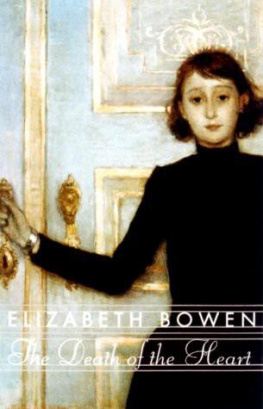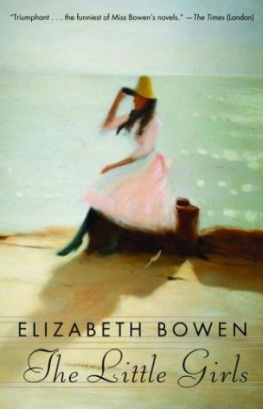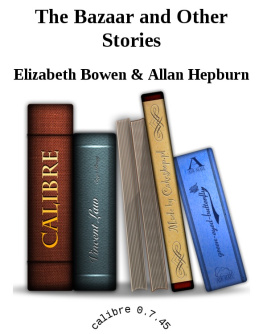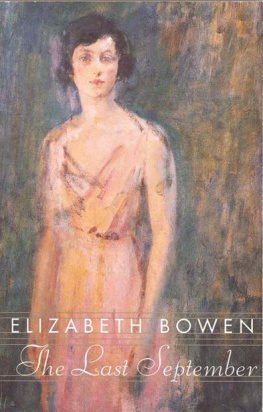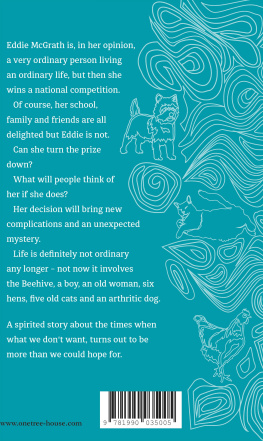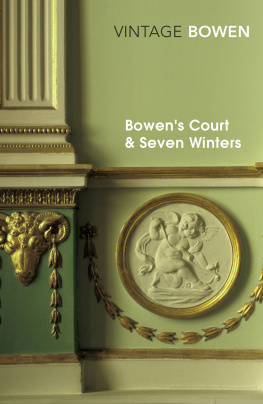ELIZABETH BOWEN
THE DEATH OF THE HEART
Elizabeth Bowen is widely considered to be one of the greatest novelists of the Twentieth Century. While her novels masquerade as witty comedies of manners, set in the lavish country houses of the Anglo-Irish or in elegant London homes, they mine the depths of private tragedy with a subtle ferocity and psychological complexity comparable to Henry James.
Ms Bowen was born in Dublin in 1899, the only child of an Irish lawyer and landowner. Her book Bowens Court (1942) is the history of her family and their house, in County Cork. Throughout her life, she divided her time between London and Bowens Court, which she inherited. She wrote many acclaimed novels and short story collections, was awarded the CBE (Companion of the Order of the British Empire) in 1948, and was made a Companion of Literature by the Royal Society of Literature in 1965. She died in 1973.
THE DEATH OF THE HEART
ELIZABETH BOWEN
Anchor Books A Division of Random House, Inc. New York
FIRST ANCHOR BOOKS EDITION, MAY 2000
Copyright rgj8, copyright renewed ig66 by Elizabeth Bowen
All rights reserved under International and Pan-American Copyright Conventions. Published in the United States by Anchor Books, a division of Random House, Inc., New York, and simultaneously in Canada by Random House of Canada Limited, Toronto. Originally published in hardcover m the United States by Alfred A. Knopf, Inc , New York, in 1939.
Anchor Books and colophon are registered trademarks of Random House, Inc.
The Library of Congress cataloged the Knopf edition as follows: Bowen, Elizabeth, 1899-1973. The death of the heart Elizabeth Bowen. Published by A. A. Knopf, New York, 1939. p. cm. PZ3.B6738 DE4 10476084 CIP
ANCHOR ISBN: 0-385-72017-3
www.anchorbooks.com
CONTENTS
The World
The Flesh
The Devil
THE WORLD
I
THAT mornings ice, no more than a brittle film, had cracked and was now floating in segments. These tapped together or, parting, left channels of dark water, down which swans in slow indignation swam. The island stood in frozen woody brown dusk: it was now between three and four in the afternoon. A sort of breath from the clay, from the city outside the park, condensing, made the air unclear; through this, the trees round the lake soared frigidly up. Bronze cold of January bound the sky and the landscape; the sky was shut to the sunbut the swans, the rims of the ice, the pallid withdrawn Regency terraces had an unnatural burnish, as though cold were light. There is something momentous about the height of winter. Steps rang on the bridges, and along the black walks. This weather had set in; it would freeze harder tonight.
On a footbridge between an island and the mainland a man and woman stood talking, leaning on the rail. In the intense cold, which made everyone hurry, they had chosen to make this long summerlike pause. Their oblivious stillness made them look like loversactually, their elbows were some inches apart: they were riveted not to each other but to what she said. Their thick coats made their figures sexless and stiff as chessmen: they were well-to-do, inside bulwarks of fur and cloth their bodies generated a steady warmth; they could only see the coldor, if they felt it, they only felt it at their extremities. Now and then he stamped on the bridge, or she brought her muff up to her face. Ice pushed down the channel under the bridge, so that while they talked their reflections were constantly broken up.
He said: You were mad ever to touch the thing.
All the same, I feel sure you would have, St. Quentin.
No, I doubt that. I never do want to know, really, what anyone thinks.
If Id had the slightest idea
However, you did.
And Ive seldom been more upset.
Poor Anna! How did you find it, though?
Oh, I wasnt looking for it, said Anna quickly. I should far rather not know that the thing existed, and till then, you see, Id had no idea that it did. Her white dress came back with one of mine from the cleaners; I unpacked mine because I wanted to put it on, then, as Matchett was out that day, I took hers up to hang it up in her room. Portia was out at lessons, of course. Her room looked, as Ive learnt to expect, shocking: she has all sorts of arrangements Matchett will never touch. You know what some servants arehow they ride one down, and at the same time make all sorts of allowance for temperament in children or animals.
You would call her a child?
In ways, shes more like an animal. I made that room so pretty before she came. I had no idea how blindly she was going to live. Now I hardly ever go in there; its simply discouraging.
St. Quentin said rather vaguely: How annoying for you! He had screwed round his head inside the folds of his scarf, to consider Anna with abstract attentiveness. For she had this little way of travestying herself and her self-pities, till the view she took of herself, when she was with him, seemed to concert exactly with the view he took of her sex. She wrote herself down like this, obligingly, to suit him, with a touch of friendly insolence. He saw in this overacting a kind of bluffing, which made him like Anna, whom he liked much, more. Her smoothness of contour, her placid derisive smile, her way of drawing her chin in when she did smile, often made him think of a sardonic bland white duck. But there seemed no doubt at this moment that, beyond acting, she was really put out: her chin was tucked inside her big fur collar, and under the fur cap she wore peaked forward her forehead was wrinkled up. She was looking down unhappily at her muff, with her fine blonde lashes cast on her cheek; now and then a hand came out of her muff and she dabbed at the tip of her nose with a handkerchief. She could feel St. Quentin looking, but took no notice: she detected the touch of malice in his pity for women.
All I did, she went on, when I had hung her dress up, was to take one look round, rather feeling I ought. As usual, my heart sank; I really did feel it was time I took a line. But she and I are on such curious termswhen I ever do take a line, she never knows what it is. She is so unnaturally callous about objectsshe treats any hat, for instance, like an old envelope. Nothing thats hers ever seems, if you know what I mean, to belong to her: which makes it meaningless to give her any present, unless its something to eat, and she doesnt always like that. It may be because they always lived in hotels. Well, one thing I had thought shed like was a little escritoire thing that came from Thomass mothersher father may well have used it. Id had that put in her room: it has drawers that lock, and quite a big flap to write on. The flap locks too: I hoped that would make her see that I quite meant her to have a life of her own. You know, though it may seem rash, we even give her a latchkey. But she seems to have lost the keysnothing was locked, and there was no sign of them.
Next page
